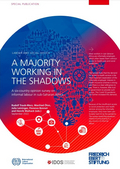A majority working in the shadows: a six-country opinion survey on informal labour in sub-Saharan Africa
Traub-Merz, Rudolf / Manfred Öhm / Julia Leiniger / Florence Bonnet / Henrik MaihackExternal Publications (2022)
Bonn: Friedrich Ebert Stiftung
ISBN: 978-3-9862814-3-4
Volltext/Full text
Informal labour plays a vital role in African economies and societies. In most African countries, between 80 and 95 per cent of the working population make a living working in the informal economy. Informality thus shapes how people live and how they interact with the state. People working and living in informality have less access to public services than people earning their income in the formal economy. They seldom benefit from state social protection and are not protected by labour and social legislation. Furthermore, the Covid-19 pandemic has worsened the conditions of many Africans living in informality. Despite the crucial role of informal labour for African economies and societies only few empirical data exist on the subject. In 2017 representatives of the International Labour Organization (ILO), the German Institute of Development and Sustainability (IDOS) together with the Friedrich-Ebert-Stiftung (FES) decided to join forces to help closing this gap and launched the multiannual comprehensive research project Informal Employment, Social Security and Political Trust in sub-Saharan Africa.


